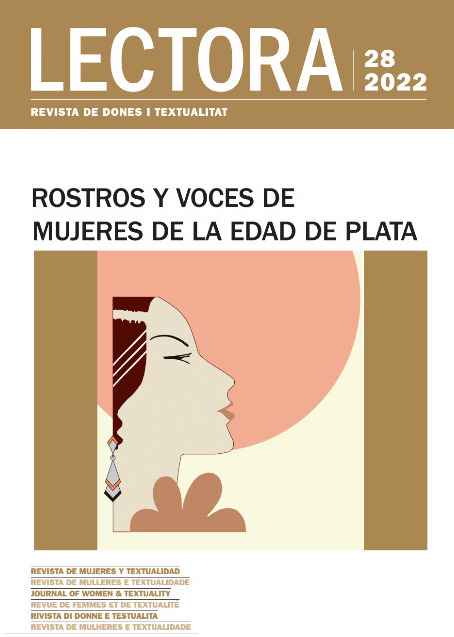Las otras voces de la Edad de Plata: Mercedes Pinto y la mujer moderna
DOI:
https://doi.org/10.1344/Lectora2022.28.7Keywords:
Mercedes Pinto, modern woman, Spanish Silver Age, "divorce as hygenic measure"Abstract
The life and work of the multifaceted Canary Islands writer Mercedes Pinto embody the modern woman who emerges in the Spanish Silver Age and prefigures a concept and an ideal to which she contributes with her novels, her plays, her lectures, her journalistic prose and her varied and intense activism. After giving a lecture entitled "Divorce as hygienic measure" at the Central University of Madrid in November 1923, she had to flee the country and go into exile in Latin America, where she lived the rest of her long life, which was spent in Uruguay, Chile, Cuba and Mexico, and where she enjoyed popularity and recognition. These pages aim to add her name to that of that group of women of the Silver Age who took a step forward in public life to claim rights and spaces of freedom and personal autonomy, showing some of the ideas, words and feminist reflections she shared in her controversial conference on divorce and in the articles she published in the newspapers of Montevideo and Havana, which became a pedagogical tool and a channel of dissemination of the figure of the modern woman.
References
Abellán, José Luis (2010), "Carmen de Burgos y el divorcio en España", Arbor, CLXXXVI (extra junio): 55-57. <http://arbor.revistas.csic.es/index.php/arbor/article/view/1190>
Burgos, Carmen de (1923), La malcasada, Valencia, Sempere.
—(1926), La confidente, Madrid, Imprenta Artística.
Ena Bordonada, Ángela (2021), "La invención de la mujer moderna en la Edad de Plata", Feminismo/s, 37: 25-52. <https://orcid.org/0000-0002-4378-1738>
Fernández, Pura (coord.) (2015), No hay nación para este sexo: la Re(d)pública transatlántica de las Letras: escritoras españolas y latinoamericanas (1824- 1936), Madrid & Frankfurt, Iberoamericana Vervuert.
F. I. R. (1933), Mercedes Pinto. De su vida y de su obra, Santiago de Chile, Imprenta Selecta San Francisco.
Gómez Blesa, Mercedes (2019), Modernas y vanguardistas. Las mujeres-faro de la Edad de Plata, Madrid, Huso.
Heitz, Françoise (2011), "De ella a Él: caras y máscaras en la ‘novela’ de Mercedes Pinto (1926) y en la película de Luis Buñuel (1952)", Arbor, 748: 371-381.
Hoyos, Matina (2021), "La malcasada: el derecho al divorcio", Amanece Metrópolis. Revista Cultural, 20/09/2021. <https://amanecemetropolis.net/la- malcasada-derecho-divorcio>
Huertas, Begoña (2021), "Carmen de Burgos, casada con nadie", La confidente, Carmen de Burgos, Madrid, Libro de la Ballena: 7-15.
Kirkpatrick, Susan (2003), Mujer, modernismo y vanguardia en España (1898- 1931), Madrid, Cátedra.
Llarena, Alicia (2003), Yo soy la novela. Vida y obra de Mercedes Pinto, Las Palmas de Gran Canaria, Ediciones del Cabildo de Gran Canaria.
Mangini, Shirley (2001), Las modernas de Madrid: las grandes intelectuales españolas de la vanguardia, Barcelona, Península.
Mañas Martínez, María del Mar y Begoña Regueiro Salgado (eds.) (2016), Miradas de progreso. Reflejos de la modernidad en la otra Edad de Plata (1898-1936), Madrid, Ediciones Clásicas.
Martínez, Rogelio (2007), Crónica del exilio de Mercedes Pinto en Uruguay. Tomo I. 1924-1925, Montevideo, Ediciones Bergamín. "Mercedes Pinto, vitalista y rebelde" (1969), Triunfo, 347: 52-53.
Pinto, Mercedes (1923), El divorcio como medida higiénica, Madrid, Imprenta Joaquín Martínez.
—(1924), Brisas del Teide, Madrid, Imprenta de Juan Pueyo.
—(1926), Él, Montevideo, La Casa del Estudiante.
—(1969), Ella, Madrid, Biblioteca Nueva.
—(2001a), Ventanas de colores, Alicia Llarena (ed.), Las Palmas de Gran Canaria, Ediciones del Cabildo de Gran Canaria.
—(2001b), El divorcio como medida higiénica, Alicia Llarena (ed.), Las Palmas de Gran Canaria, Ediciones del Cabildo de Gran Canaria.
—(2001c), Un señor cualquiera, Alicia Llarena (ed.), Las Palmas de Gran Canaria, Ediciones del Cabildo de Gran Canaria.
—(2021), Al volar. El País Gráfico 1950-1951, Alicia Llarena (ed.), Sevilla, Renacimiento.
Romero López, Dolores (2021), "La mujer moderna de la Edad de Plata (1868-1936): disidencias, invenciones y utopías. Introducción", Feminismo/s, 37: 13-24. <https://rua.ua.es/dspace/bitstream/10045/111715/1/Feminismos_37_01.pdf> Ronzoni, Raúl (2013), Mercedes Pinto. Indómita y seductora, Montevideo, Fin de Siglo.
Downloads
Published
How to Cite
Issue
Section
License
The Author retains ownership of the copyright in this article and grants Lectora: revista de dones i textualitat the rights to print publication of the Article. The work will be available under a Creative Commons Attribution-Noncommercial-No Derivative Works license, by which the article must be credited to the Author and the Journal be credited as first place of publication.
The Author is free to enter in seperate, additional contractual agreements for the non-exclusive distribution of the work as published in this journal (such as institutional repositories or a book), as long as the original publication in Lectora is credited.
The Author is encouraged to post the work online (eg in institutional or thematic repositories, or in their website), as it can lead to productive exchanges as well as to a greater citation of the published work (see The Effect of Open Access).




